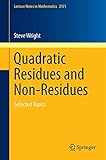Quadratic Residues and Non-Residues [electronic resource] : Selected Topics / by Steve Wright.
Material type: TextSeries: Lecture Notes in Mathematics ; 2171Publisher: Cham : Springer International Publishing : Imprint: Springer, 2016Description: XIII, 292 p. 20 illus. online resourceContent type:
TextSeries: Lecture Notes in Mathematics ; 2171Publisher: Cham : Springer International Publishing : Imprint: Springer, 2016Description: XIII, 292 p. 20 illus. online resourceContent type: - text
- computer
- online resource
- 9783319459554
- 512.7 23
- QA241-247.5
Chapter 1. Introduction: Solving the General Quadratic Congruence Modulo a Prime -- Chapter 2. Basic Facts -- Chapter 3. Gauss' Theorema Aureum: the Law of Quadratic Reciprocity -- Chapter 4. Four Interesting Applications of Quadratic Reciprocity -- Chapter 5. The Zeta Function of an Algebraic Number Field and Some Applications -- Chapter 6. Elementary Proofs -- Chapter 7. Dirichlet L-functions and the Distribution of Quadratic Residues -- Chapter 8. Dirichlet's Class-Number Formula -- Chapter 9. Quadratic Residues and Non-residues in Arithmetic Progression -- Chapter 10. Are quadratic residues randomly distributed? -- Bibliography.
This book offers an account of the classical theory of quadratic residues and non-residues with the goal of using that theory as a lens through which to view the development of some of the fundamental methods employed in modern elementary, algebraic, and analytic number theory. The first three chapters present some basic facts and the history of quadratic residues and non-residues and discuss various proofs of the Law of Quadratic Reciprosity in depth, with an emphasis on the six proofs that Gauss published. The remaining seven chapters explore some interesting applications of the Law of Quadratic Reciprocity, prove some results concerning the distribution and arithmetic structure of quadratic residues and non-residues, provide a detailed proof of Dirichlet’s Class-Number Formula, and discuss the question of whether quadratic residues are randomly distributed. The text is a valuable resource for graduate and advanced undergraduate students as well as for mathematicians interested in number theory.


There are no comments on this title.